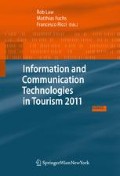Abstract
Contextual computing is becoming an increasingly important research field in tourism. It is essential to have a substantial understanding of how these systems work and to measure the extent to which real visitors are ready and willing to use them. Thus, this study proposes a two level evaluation that measures the technical performance of a particular contextual computing system, named CONCERT, according to various variables on the one hand, and that assesses the extent to which visitor experience improves by using these types of services. A series of key relationships have been found between the results of the technical and user evaluations. The findings of the user evaluation provide significant insight into the role of contextual computing services in tourism to increase visitors’ experience.
Preview
Unable to display preview. Download preview PDF.
References
Beer, T., Fuchs, M., Höpken, W., Rasinger, J & Werthner, H., (2007). CAIPS: A Context-Aware Information push Service in Tourism. In M. Sigala, L. Mich, & J. Murphy (Eds.) Information and Communication in Tourism (pp. 129–140).
Chen, G. & Kotz, K., (2001). A Survey on Context-Aware Mobile Computing Research. Dartmonth College.
Chen, H., Finin, T & Joshi, A., (2003). An ontology for Context-Aware Pervasive Computing Environments.
Dey, A.K & Abowd, G.D., (2001). Towards a better understanding of context and context awareness. Proceedings of the workshop on the What, Who, Where, When and how of Context Awareness, ACM Press, New York. 2000.
Gruber, T. R., (1994). Toward Principles for the Design of Ontologies Used for Knowledge Sharing. In Formal Ontology in Conceptual Analysis and Knowledge Representation. Kluwer Academic Publishers.
Grün, C., Pöll, B., Werthner, H., Retschitzegger, W & Schwinger, W., (2008). Assisting Tourists on the Move: An evaluation of Mobile Tourist Guides. 7th International Conference on Mobile Business (pp. 171–180).
Gu, T., Pung, H. K & Zhang, D. Q., (2004). A service oriented middleware for building context-aware services. Journal of Network and Computer Applications: 1–18.
Haase, P., Rudolph, S., Wang, Y., Brockmans, S., Palma, R., Euzenat, J. & d’Aquin, M., (2006). NeOn Deliverable D1.1.1 Networked Ontology Model.
Höpken, W., Fuchs, M., Zanker, M., Beer, T., Eybl, A., Flores, S., Gordea, S., Jessenitschning, M., Kerner, T., Linke, D., Rasinger, J. & Schnabl, M., (2006). etPlanner: An IT Framework for Comprehensive and Integrative Travel Guidance. In Hitz, Sigala and Murphy (Eds.) Information and Communication Technologies in Tourism (pp. 125–134).
Lamsfus, C., Alzua-Sorzabal, A., Martin, D., Salvador, Z. & Usandizaga, A., (2009). Human-Centric Semantic-based Context Modelling in Tourism. International Conference on Knowledge Engineering and Ontology Development, KEOD, pp. 424–434.
Preuveneers, D., Van den Bergh, J., Wagelaar, D., Georges, A., Rigole, P., Clerckx, T., Berbers, Y., Connix, K., Jonckers, V. & de Bosschere, K., (2004). Towards an Extensible Context Ontology for Ambient Intelligence.
Schilit, B. N. Adams, N. W. R. & Roy, W., (1994). Context-Aware Computing Applications.
Strang, T & Linnhoff-Popien, C., (2004). A Context-Modelling survey. First International Workshop on Advanced Context Modelling, Reasoning and Management. UbiComp.
Strimpakou, M. A., Roussaki, I. G. & Anagnostou, M. (2006). Context Ontology for Pervasive Service Provision. Proceedings of the 20th International Conference on Advanced Information Networking and Applications.
Suárez-Figueroa, M. C., Aguado de Cea, G., Buil, C., Dellschaft, K., Fernández-López, M., García, A., Gómez-Pérez, A., Herrero, G., Montiel-Ponsoda, E., Sabou, M., Villazón-Terrazas, B. & Yufei, Z., (2008). NeOn D5.4.1: NeOn Methodology for Building Contextualized Ontology Networks. NeOn project.
Want, R., Hpper, A., Falcao, V. & Gibbons, J., (1992). The Active Badge Location System. ACM Transactions on Information Systems: 91–102
United Nations World Tourism Organization, (2008). International Recommendations for Tourism Statistics. ST/ESA/STAT/SER.M/83/Rev.1. Madrid, New York.
Author information
Authors and Affiliations
Editor information
Editors and Affiliations
Rights and permissions
Copyright information
© 2011 Springer-Verlag/Wien
About this paper
Cite this paper
Lamsfus, C., Alzua, A., Martin, D., Smithers, T. (2011). An Evaluation of a Contextual Computing Approach to Visitor Information Systems. In: Law, R., Fuchs, M., Ricci, F. (eds) Information and Communication Technologies in Tourism 2011. Springer, Vienna. https://doi.org/10.1007/978-3-7091-0503-0_15
Download citation
DOI: https://doi.org/10.1007/978-3-7091-0503-0_15
Publisher Name: Springer, Vienna
Print ISBN: 978-3-7091-0502-3
Online ISBN: 978-3-7091-0503-0

